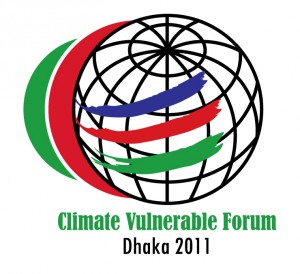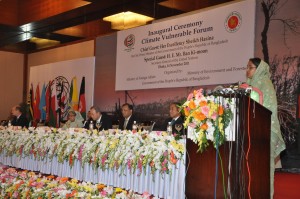November 14, 2011
Inaugural Speech presented at the Climate Vulnerable Forum 2011 in Dhaka, Bangladesh
By the Honorable Foreign Minister of Bangladesh, Dipu Moni

It is my pleasure to welcome you at this Ministerial meeting of the Climate Vulnerable Forum. We thank the Ministers and delegates for attending this meeting.
The presence of over 20 delegations from CVF members from Africa, Asia and the Pacific, and the Caribbean underscores the desire of these countries to be heard; their perspectives to be taken into account in the climate change discourse. In fact, climate change is unforgiving, irrespective of location and historical contribution to its causes. We are hopeful that this conclave will shape a critical visible mass with a capacity to impact the outcome in climate change negotiations. It is reassuring that a good number of our partner countries, international organisations as well as non-state stakeholders have also gathered here to extend their hands of cooperation. Together, we intend to discuss the content and contours of future engagement to make a difference and indeed to reduce our vulnerability. We are particularly beholden to the Climate and Development Knowledge Network (CDKN), DARA and UNDP for their support and their faith in our capacity to make a difference.
We are grateful to Secretary-General Ban Ki-moon for his presence here today. He has adjusted his travel plans for this and we acknowledge his personal commitment and the UN system’s keenness to internalise concerns of the climatically vulnerable countries in their programmes.
Climate change is a reality that is playing havoc with human lives and livelihood as well as the environment, natural resources and infrastructures. Most of the severely affected countries are countries with limited coping capacities, which render them particularly vulnerable. For Bangladesh, our susceptibility comes from our geographical location and a global phenomenon to which we have not contributed at all.
CVF members have inadequate preparedness, resilience, and adaptive capacities. External support is therefore critical for us to be able to adapt well and manage impacts better. We need support in areas of adaptation, capacity building and technology transfer.
We are grateful to the Maldives for taking the lead in 2009 in creating this platform. Taking inspiration from the outcome of previous meetings and their impact on the international climate discourse, we have decided to invite more countries based on risks that they face and the extent of their vulnerability. We hope that this broad-based coalition would afford us greater strength and voice to raise our legitimate demands at the Durban climate talks.
CVF 2011 seeks to increase the level of awareness in the public domain of the dangerous consequences of climate change for vulnerable communities, of remedial actions and of the opportunities that exist amidst challenges. While we identify collective actions, we would seek to forge enhanced understanding with other state parties and international actors of the urgency to act and of economic and technological requirements.
The process of negotiations in the UNFCCC and poor realisation of committed international support do not inspire either in their content or in pace. We see little prospect of easy and direct access to funds and technology for the most vulnerable countries. Disbursement is extremely slow and often is donor-driven. There is lack of clarity on new and additional funds for the vulnerable countries. We need clearly outlined supportive measures on adaptation.
“CVF 2011 seeks to increase the level of awareness in the public domain of the dangerous consequences of climate change for vulnerable communities.“
We must also appreciate that adaptation is very costly, as our access to technology is limited. And then, adaptation cannot be an endless process, without matching concrete and time-bound progress on mitigation. Hence, the need for immediate conclusion of negotiations on the second commitment period under the Kyoto Protocol. Any further delay may undermine the legally-binding international climate regime and create a legal vacuum. Here, it would be logical for major emitters including from the developing world to manifest commitment. Countries from the developing South may voluntarily accept mitigation commitments, based on equity and their own capacities.
We must also acknowledge that we face an uninspiring future. Sitting idle in such a situation is no option. We have to take the lead and show to the world that we are ready to accept moral leadership. We ought to express firm resolve to pursue green growth paths voluntarily as we remain steadfast in our endeavors to reduce poverty and attain economic growth. We must be ready to lead by example.
Our objective is also to add dynamism to the Forum. CVF 2011, it would appear, has already generated interest among the stakeholders which, we expect, would help put our concerns and challenges at the core of global development and the environment agenda.
Our senior officials met yesterday and have secured significant convergence on the way forward. I am confident that our deliberations at the Ministerial level would contribute to making the CVF a sustainable platform. We are encouraged to have the Honourable Prime Minister of Bangladesh in our midst today. Through her relentless efforts and strong leadership, she has been successful in bringing the plight and the need of the climatically vulnerable countries at the centre of the climate change discourse. I am confident that we will benefit from her wise counsel and guidance towards adding further dynamism to our Forum and making it relevant in the global climate and development discourse.
I thank you once again for joining CVF 2011 and contributing to its success.

Share this